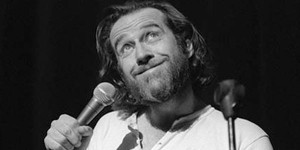Comedy legend George Carlin dead at 71 U.S. comedian George Carlin, the influential godfather of counterculture comedy and originator of the classic “seven words you can’t say on television,” has died. CTV.ca News Staff
 He passed away of heart failure on Sunday in Santa Monica, Calif.
He passed away of heart failure on Sunday in Santa Monica, Calif.
Jeff Graham, Carlin’s publicist, said the 71-year-old went to hospital Sunday afternoon complaining of chest pain and died that evening.
He had performed a week ago in Las Vegas but has had a history of heart trouble.
On June 17, it was announced that Carlin had been awarded the 11th annual Mark Twain Prize for American Humour.
He first performed his “seven words” bit in Milwaukee in 1972. It got him arrested for disturbing the peace. A judge dismissed the case, saying it was indecent but not obscene and didn’t disturb the peace.
When a New York radio station broadcast the routine, it led to a 1978 U.S. Supreme Court ruling that upheld the government’s authority to sanction stations that broadcast offensive language.
“So my name is a footnote in American legal history, which I’m perversely kind of proud of,” Carlin said earlier this year.
Over his career Carlin released 23 comedy albums, 14 HBO specials, had a few TV shows and appeared in several films.
“He was the consummate nightclub stand-up comedian,” film critic Richard Crouse told Canada AM on Monday. But Crouse said Carlin was too idiosyncratic to make it big in film the way that contemporaries like Richard Pryor did.
Carlin guest-hosted the first broadcast of “Saturday Night Live,” admitting on his website that he had been “loaded on cocaine” the entire week before the broadcast. He did at least one stint in drug rehab over the course of his life.
Born May 12, 1937, Carlin was a native of Manhattan’s Morning Heights neighbourhood. His single mother raised him.
A high-school dropout, Carlin joined the U.S. Air Force. According to his official website, Carlin received three courts-martial and numerous disciplinary punishments.
It may or may not be telling that in touting his brother Patrick’s novel “Highway 23,” Carlin said people should read it if they:
The website seems to take pride in recording Carlin’s anti-authority streak.
It notes, for example, that after starting a disc jockey job in Boston, he was “fired after three months for driving a mobile news van to New York to buy pot.”
He had also worked as a carnival organist and as a market director for a peanut brittle company.
Career beginnings
In 1960, he went to Hollywood with a buddy where they formed a comedy team.
An early comedy hero for Carlin was comedian Danny Kaye, whose heyday was in the 1950s.
“He was a typical nightclub comic (of the time),” Crouse said of the early Carlin. “He wore a suit. His hair was slicked back.”
But Carlin said that mainstream style didn’t work for him.
“I was doing superficial comedy entertaining people who didn’t really care: businessmen, people in nightclubs, conservative people. And I had been doing that for the better part of 10 years when it finally dawned on me that I was in the wrong place doing the wrong things for the wrong people,” he said in a recent interview.
By 1970, Carlin had moved decisively to the edge, although Crouse noted the first true shock comic was Lenny Bruce, who was routinely getting arrested in the early 1960s. Carlin dropped the suits, dressed in either jeans or all-black and grew a beard and ponytail. He started doing routines about drugs and other counterculture material emblematic of the times.
Here’s a Canadian reference from his “hippy dippy weatherman” character: “The weather was dominated by a large Canadian low, which is not to be confused with a Mexican high. Tonight’s forecast … dark, continued mostly dark tonight turning to widely scattered light in the morning.”
Crouse noted that despite the raunchiness of his nightclub act, Carlin still appeared on decidedly mainstream shows like Ed Sullivan.
“The thing that made George Carlin great was he really treated the English language as a living, breathing thing,” he said. “He was a comic that other comics looked up to.”
In his later years, Carlin also did voice work for children’s TV shows and movies.
Carlin’s first wife Brenda died in 1997. He is survived by wife Sally Wade; daughter Kelly Carlin McCall; son-in-law Bob McCall; brother Patrick Carlin; and sister-in-law Marlene Carlin.
With files from The Associated Press
Leave a Reply
You must be logged in to post a comment.
